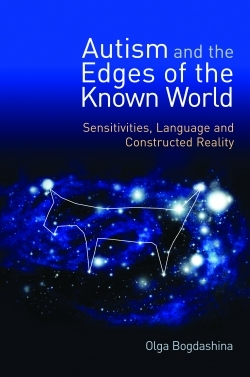Autism and the Edges of the Known World
Sensitivities, Language, and Constructed Reality
Autism is still a mysterious condition, but Olga Bogdashina finds evidence to suggest that we have much to learn about the world and our relationship to it from people who are almost continually exposed to a wide range of intense sensation.
Bogdashina, an educator, researcher, and the parent of an adult with autism, examines the process of consciousness and compares the experiences of non-autistic people with those of autistic people. While non-autistic people may look at a kitchen and immediately be able to recognize it as such from the presence of a stove, sink, and refrigerator, an autistic person may have to notice and identify every individual clue before labeling the scene correctly. While this process might be considered a cumbersome method in the context of society’s drive toward instant gratification and high speed activity, autistic people who view the world this way perceive the entire world in front of them instead of the brief sampling many non-autistic people come to rely upon. Thus, they can find things other people miss.
Bogdashina argues against the dismissive reaction of many scientists when faced with ultra-sensory scenarios that might be construed as supernatural. She writes, “It is healthy to be skeptical about these phenomena but instead of denying their existence, isn’t it wiser (and more scientific) to accept that if we cannot explain certain things it does not mean they do not exist, so we should try to find a possible explanation?” She points out that many of the facts we take for granted, such as a sun-centered universe and a round earth, were once considered blasphemy.
The book makes use of the personal experiences of autistic people, including Temple Grandin and Donna Williams. Their own words help illustrate a vibrant world that many non-autistic people are cut off from. Bogdashina also delves into the studies and reports of many established scientists, both to support her own statements and to offer alternative viewpoints. While her writing is lovely and inspiring, it is always based in scientific methodology and reflects her respect for scientific process.
While other educators and researchers will find much to ponder on this book, Bogdashina’s writing is also accessible to readers without advanced degrees. Even when dealing with complex subject matter, her writing is lucid and engaging.
Readers looking for answers about autism will find Bogdashina’s books fresh and useful; anyone interested in the questions of consciousness and experience will find it riveting.
Reviewed by
Andi Diehn
Disclosure: This article is not an endorsement, but a review. The publisher of this book provided free copies of the book and paid a small fee to have their book reviewed by a professional reviewer. Foreword Reviews and Clarion Reviews make no guarantee that the publisher will receive a positive review. Foreword Magazine, Inc. is disclosing this in accordance with the Federal Trade Commission’s 16 CFR, Part 255.

